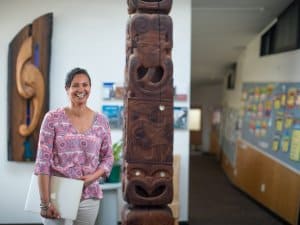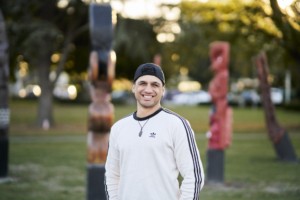Piki mai, kake mai rā ki Te Aho ā Māui
If you want to play a part in shaping a positive social, political and economic future for Aotearoa New Zealand, a thorough understanding of te reo Māori and tikanga is essential as special taonga, to be shared with all New Zealanders.
With Te Whakangungutanga ki Ngā Tāiro a Kupe | Bachelor of Arts (Māori) you’ll enhance your career prospects and social standing within the community while contributing to the ongoing drive to revitalise the culture and language of indigenous New Zealand.
Te Whakangungutanga ki Ngā Tāiro a Kupe | Bachelor of Arts (Māori) is a full-time, three year programme (or equivalent part-time) which will enable you to pursue a professional career in a variety of fields. In particular, the programme is designed to:
- Give you proficiency in Māori language, customs and culture
- Enhance your career prospects and social standing within your community
Upon graduating you can gain entry into the one year, full-time Te Pikitanga ki Awarua | Bachelor of Arts (Māori) Honours programme.
You are welcome to make an appointment to discuss your study options with our staff and to view our facilities.
If you have any questions please feel free to contact us.
Career and Study Opportunities
As a graduate you will be able to pursue a professional career in a variety of fields, for instance:
- Government departments
- Hospital boards
- Teaching (kōhanga, primary to secondary, adult)
- Working with local Iwi (liaison, policy advisor)
- Television/radio (reporter, scriptwriter, announcer, bilingual researcher)
Upon graduating you can gain entry into the one year, full-time Te Pikitanga ki Awarua | Bachelor of Arts (Māori) Honours programme or look into Masters studies.
Dates
There are two entry dates per year:
Graduate Profile
Ka ren Albert completed her Bachelor of Arts (Māori) degree at Te Whatukura, Tairāwhiti. Karen shares with us her experiences, her journey and her passion for supporting students during their time at EIT.
ren Albert completed her Bachelor of Arts (Māori) degree at Te Whatukura, Tairāwhiti. Karen shares with us her experiences, her journey and her passion for supporting students during their time at EIT.
Academic Learning Services
Academic Learning Services is here to assist you on your journey towards the successful completion of your studies at EIT. Our aim is for you to become confident, competent and independent learners.
We have dedicated advisors who can assist with your learning.
Find out more:
Hawke’s Bay Campus
Tairāwhiti Campus
Graduate thanks Kaiwhakaako
 “It has been an honour studying at EIT with Te Ūranga Waka. The calibre of kaiwhakaako who understand and experience te ao Māori first hand has allowed me to follow my dreams of being a te reo Māori champion.
“It has been an honour studying at EIT with Te Ūranga Waka. The calibre of kaiwhakaako who understand and experience te ao Māori first hand has allowed me to follow my dreams of being a te reo Māori champion.
I could not have done this without doing my Bachelor of Māori studies and I thank these kaiwhakaako for
my success”
Ethan Pineaha-Burns
Bachelor of Arts (Māori)
Scholarships
 EIT offers a variety of scholarships across various subjects and programme levels. Some scholarships are based on your age, some are specific to the subject you want to study. Not all scholarships are based on your academic ability and anyone wanting to study should investigate what scholarships are available to them.
EIT offers a variety of scholarships across various subjects and programme levels. Some scholarships are based on your age, some are specific to the subject you want to study. Not all scholarships are based on your academic ability and anyone wanting to study should investigate what scholarships are available to them.
You can find a list of EIT scholarships here however there are many more scholarships offered nationally. Information about these is on an database called “givME”. givME is accessible at EIT or at some public libraries. If you would like to come to EIT to look through the giveME database don’t hesitate to contact scholarships@eit.ac.nz or call in for a chat.
